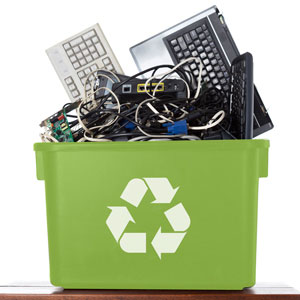 28/04/2023
28/04/2023We invite relevant organisations to submit a proposal to undertake the work outlined in this tender document.
Waste Electrical and Electronic Equipment (WEEE) is one of the fastest growing waste streams in Europe and worldwide. It is expected that globally, 74.7 Mt of e-waste, everything with a plug or battery, will arise annually by 2030. In the EU alone, 12 Mt of WEEE arises each year, ranking first worldwide in terms of e-waste generation per capita (16.2 kg), but also with the highest collection and recycling rate equivalent to 42.5% of WEEE generated.
The EU is committed to improving the small WEEE collection rate. The European Green Deal states that the Commission “will assess […] the benefits of supporting ‘take-back’ schemes to incentivise people to return their unwanted devices such as mobile phones, tablets and chargers” and the 2020 Circular Economy Action Plan announced that the Circular Electronics Initiative will explore “options for an EU-wide take back scheme to return or sell back old mobile phones, tablets and chargers”.
Against this background and with the general aim of practically testing several methods and incentives to increase the collection rate of small WEEE and portable batteries, the LIFE-ECOSWEEE project sets the following specific objectives:
1. Identify good practices, drivers and obstacles in the collection of small UEEE, WEEE and portable batteries through literature review and surveys. Run consumer consultations identifying stakeholders’ needs and habits in returning small U/WEEE and batteries based on national consumer consultations.
2. Test the feasibility and effectiveness of different incentives (including deposit return systems, direct payment, online retail, visible fee, other financial incentives and improvement of collection network) to support the take back obligation and improve the collection rate of small electronics (WEEE, used electrical and electronic equipment (UEEE)) and portable batteries in pilots (in different countries) for the compilation of successful take-back schemes, also taking into account the inputs from already ongoing or planned initiatives.
3. Evaluate the pilots and select the most effective strategies to:
- Increase the collection rate of small electronics and portable batteries.
- Increase the recovery of secondary raw materials including critical raw materials.
- Identify the contextual factors that might impact the effectiveness of the strategies under study in different countries.
The project will also:
- Present findings and policy recommendations that will input the evaluation of WEEE legislation and the proposed Batteries Regulation and other policies in Europe, e.g., related to visible fee, reduced VAT for re-used WEEE and waste shipments.
- Develop good practices for the exploitation, upscale, and sustainability of the project’s results at Member State and EU level.
- Build a Stakeholder Platform.
About
The WEEE Forum a.i.s.b.l. is an international association representing 51 producer responsibility organisations across the globe. Together with our members, we are at the forefront of turning the extended producer responsibility principle into an effective electronic waste management policy approach through our combined knowledge of the technical, business and operational aspects of collection, logistics, de-pollution, processing, preparing for reuse and reporting of e-waste. Our mission is to be the world’s foremost e-waste competence centre excelling in the implementation of the circularity principle.
Transparency Register ID 702397445-73.
Copyright 2019 All Rights Reserved
Contact
BluePoint conference and
business centre
Boulevard Auguste Reyerslaan 80
B-1030 Brussels
Belgium
Newsletter
Subscribe to our mailing list to get the updates to your email inbox.